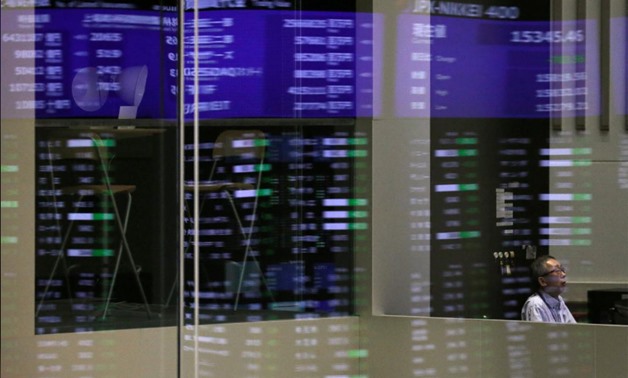
Market prices are reflected in a glass window at the Tokyo Stock Exchange (TSE) in Tokyo, Japan, February 6, 2018. REUTERS/Toru Hanai
LONDON - 16 August 2018: Bruised world shares and emerging market currencies fought to regain their footing on Thursday, after China said it will hold trade talks with the United States later this month and Turkey’s lira continued its recovery run.
Asian equities had hit one-year lows overnight as they tracked Wednesday’s global falls and Tencent results disappointed, but a fresh recent high for the FTSE and modest gains elsewhere pulled Europe up early on.
A dip in the dollar .DXY and the sight of the lira striding back above 6 per dollar TRYTOM=D3 and a higher Chinese yuan also steadied emerging market currencies like South Africa's rand, Russia's rouble and Mexico's peso.
EM stocks nudged lower again though after they had crossed the 20 percent peak-to-trough threshold that defines a ‘bear’ market. Metals markets clawed higher, however, after copper had also entered ‘bear’ territory.
“The Chinese are heading to Washington and yuan bounced, the Qataris are heading to Ankara and the lira bounced and has left everything else floating around really,” said Societe Generale’s global head of currency strategy Kit Juckes.
He added that it was still too early to sound the all clear around Turkey - its new finance minister and son-in-law of President Tayyip Erdogan will hold a global conference call later - and that the broader worries were still around the extent of China’s economic slowdown.
China on Thursday said a delegation led by its vice commerce minister would travel to the United States for talks in late August at the invitation of Washington.
That helped Chinese stocks pare losses, with both Shanghai Composite Index .SSEC and Hong Kong's Hang Seng index .HSI each down 0.8 percent. Earlier in the day, Shanghai was down as much as 1.9 percent while Hong Kong was off 1.7 percent.
Japan's Nikkei average .N225 closed 0.1 percent lower in choppy trade, with the benchmark falling as much as 1.5 percent before a brief swing into positive territory on China news.
The euro EUR= rose 0.3 percent and the offshore Chinese yuan CNY=D4 gained 0.8 percent following Sino-U.S. trade talk news. U.S. stock futures ESc1 rose 0.4 percent.
“The news (of the China-U.S. trade talks) triggered short-covering but I think fundamentally it is of limited significance,” said Yasuo Sakuma, chief investment officer at Libra Investments.
Sakuma said Turkey’s market swings reflect the fact that it is one of the more vulnerable parts of the global economy at this stage in the interest rate cycle, as the Federal Reserve seeks to normalize its monetary policy.
However, he noted there were arguably larger risks for investors, such as weak earnings from Tencent Holdings Ltd (0700.HK).
The Chinese tech giant reported its first quarterly profit fall in nearly 13 years on weak gaming revenue - it holds a 40 percent stake in the U.S. firm that makes cult game Fortnite.
That had knocked other Asian tech firms with South Korea’s Samsung Electronics (005930.KS), Asia’s third largest firm by market cap, down to a one-year low.
Though metals strengthened, oil prices were left flat after data showed a surprise weekly increase in U.S. crude stockpiles, compounding worries about a weaker global economic growth.
Brent was at just over $70 a barrel and U.S. crude oil CLc1 last stood at $65.12 per barrel, having fallen to two-month lows of $64.42 per barrel, following Wednesday’s 3.2 percent fall.
The tentative recovery in risk appetite also saw bond benchmark German Bund and U.S. Treasury yields, which move inverse to the bond’s price, nudge up.

Comments
Leave a Comment